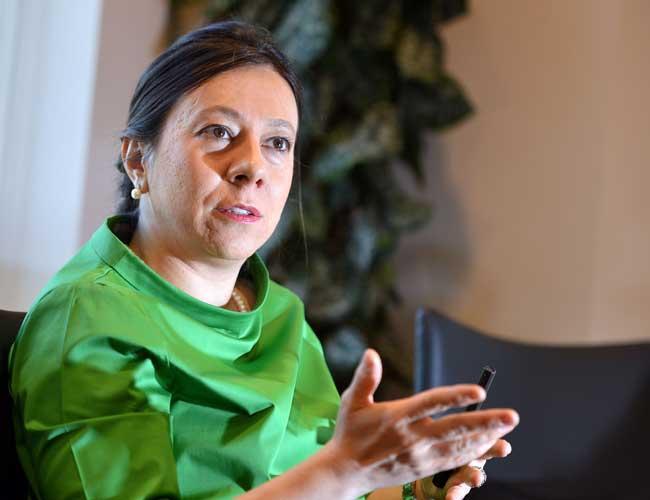
A trilateral summit between the Russian, Iranian and Turkish leaders and a crucial meeting between President Recep Tayyip Erdoğan and his Russian counterpart Vladimir Putin in Ankara early April were not photo opportunities showing a change in the strategic identity of Turkey, but were indicators of the country’s rising strategic importance, Ayşe Sözen Usluer, the head of international relations of the Presidency, has said.
“To me, that photo op underlines the strategic importance of Turkey and shows its rise in foreign policy. This is not a shift of axis,” she said in an interview with the Hürriyet Daily News.
Erdoğan’s intense dialogue with Putin is considered by some circles as Turkey dragging itself away from the West, she said.
“No. This is a matter of circumstances,” she added.
“For the last 10-15 years in particular, Turkey has not felt the need to choose between the West and the East, or between the U.S. and Russia. Turkey no longer sees its foreign policy within the framework of the Cold War or East vs. West alliances,” Usluer said.
She stressed that Ankara has long ago preferred to “diversify its foreign policy choices,” referring to Turkey’s initiatives on Africa and South America.
Speaking about Turkey’s cooperation with Iran and Russia on the Syrian crisis, she said: “Russia settled in Syria and became a decisive actor in this crisis. One cannot even imagine resolving the Syrian crisis without including Russia in this equation. Likewise, Iran has stood behind the regime dedicatedly since the beginning of the war and became a determinant force of the war involving its militia in the offensives.”
Turkey’s dialogue with Russia and Iran “is an asset for the West” because “they are not able to create such a dialogue” with these actors, she said.
“They are aware that they will not be able to resolve the crisis in Syria without them. In fact, Turkey serves as a bridge between the West and these countries,” she stated.
Usluer refuted claims Russia was taking advantage of the bilateral problems Turkey was facing with some Western countries and that it was pushing Turkey away from NATO. She underlined Turkey’s independent foreign policy understanding.
“We know that Turkey is a very important member in the NATO alliance, and this partnership is indispensable for both sides. If we are giving a close picture with Russia regarding Syria, and we have relations with Russia, it certainly does not mean that we have abandoned the alliances we had established with the West,” she added.
Turkey gained leverage in Syria after military ops
Usluer said Turkey has gained leverage in the upcoming political process of the Syrian crisis after the Turkish army conducted operations into Syria.
“Turkey has turned into a very powerful actor both on the field and at the table after the Euphrates Shield and Afrin operations. I believe that after these operations Turkey will have an upper hand in the political settlement process,” she said.
Usluer said administrative councils were established in Afrin after three principles were taken into account: The representation of the local population, preserving its demographic structure and not having links to terrorist organizations.
In Afrin city center a local council is represented by 11 Kurds, eight Arabs and one Turkmen, while another local council in Jinderes is formed of 11 Kurds and four Arabs, she noted.
FETÖ lost its operational power abroad
Usluer said 83 members of the Fetullahist Terrorist Organization (FETÖ) from 19 countries were extradited to Turkey recently.
The Turkish government has also been in efforts to close down schools abroad linked to the Gülen movement, believed to have orchestrated the 2016 coup attempt. A total of 76 schools were closed in 10 countries and agreements were made with 25 other countries to hand over FETÖ-linked schools, she added.
Usluer said several countries, particularly those in Africa and Central Asia, understood why Turkey perceived FETÖ as a threat, but the U.S. was having difficulties comprehending this.
“I think they have lost their operational capacity abroad. But that does not mean they have lost their undercover presence,” she said.
Usluer has been the head of international relations of the Presidency since 2014, but has been in close duty with Erdoğan since 2001. She had served as the foreign affairs coordinator of the ruling Justice and Development Party (AKP) for seven years.